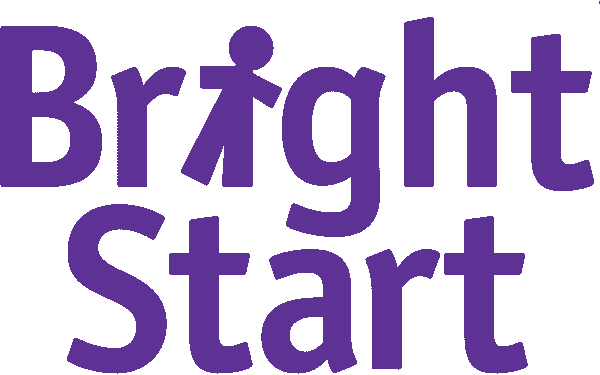Katie:
Hey, everyone. My name is Katie and I’m a Speech Therapist for Bright Start. Today, I will be discussing the benefits of using social games in verbal routines to address pre-verbal and early language skills. So, first of all, what are social games in verbal routines? Well, social games are songs and rhymes that include movements. A common example of this would be patty cake. Verbal routines are words and phrases that are repeated at predictable times during a routine. They are both practical, natural ways to address multiple goals. Some goals that are often targeted using these games include early skills, such as noticing, participating, anticipating, and requesting the game. Social games and verbal routines can also be used to address communication concepts, such as joint attention, turn taking, imitation of motor movements, following directions, building knowledge and use of vocabulary, making requests, and understanding concepts like spatial concepts, whether that be on top, in, off, fast, slow, open, close, up, down, and many more. In the first video, you will see a child and I playing the game of “Ahh choo!” Notice that as she begins to initiate the game, I start to introduce her to directional terms up and down. She is then able to change up the routine and include different stuffed animals. One thing to keep in mind during these games is the importance of exaggerating your voice and facial expressions. This helps to keep the child engaged and makes it easier for the child to imitate.
Katie:
Ahhh choo! Can you put it on the unicorn’s head?
Speaker 2:
Ahh.
Katie:
Ahh choo!
Speaker 2:
Ahh choo!
Katie:
Yay! Here we go. Up, up, up, up, up, up, up, down. Ahh choo!
Speaker 2:
Choo!
Katie:
Yay! Your turn.
Speaker 2:
Ahh…
Katie:
You say up, up, up, up, up, up, up, down. Put it on the unicorn.
Speaker 2:
Up, up, up, up, up, down.
Katie:
Good. Ahh…
Speaker 2:
Choo!
Katie:
Yay! Good job.
Katie:
This next video uses the same game in vocabulary in a different way. Depending on the child’s preference, he or she may enjoy the sensory input that movement provides. Requesting was a target goal of this activity. After each cycle of the game, I cued the child to express her wants using verbalizations and gestures of more, please. When she attempted to do so, I would reward her with another cycle of the game.
Katie:
Up, up, up, up, up. Ahh choo! Down.
Speaker 2:
Up, up.
Katie:
Up, up, up, up, up. Ahh choo! Down. You want more?
Speaker 2:
Up, up, up.
Katie:
You say, “More, please.”
Speaker 2:
More, please.
Katie:
Good job. Up, up, up, up, up, up. Ahh choo! Down. You want more?
Speaker 2:
More. More, please.
Katie:
Up, up, up, up, up. Ahh choo! Down.
Katie:
The third video shows the child and I playing a game of ready, set, go. Now, this particular child is a pro at these games, but if a kid is just being introduced, it is important to use pauses between utterances and appropriate wait time so that it will encourage the child to anticipate verbalizations and eventually join in with utterances. For example, wait time for this particular game would sound like, “Ready, set, go!” Wait time along with the exaggerated facial expressions and voice will encourage kids to anticipate and participate in these games.
Speaker 2:
Up.
Katie:
Ready, set, go!
Speaker 2:
Ready, set, go!
Katie:
Woo! Ready…
Speaker 2:
Set, go!
Katie:
Whee!
Speaker 2:
One, two, three!
Katie:
Go! Whee!
Speaker 2:
One, two, three. Ready, set, go!
Katie:
Whee! Do you want to go fast or slow?
Speaker 2:
Fast.
Katie:
Fast?
Speaker 2:
Fast.
Katie:
Okay. You say, “Fast, please.”
Speaker 2:
Fast…
Katie:
Please.
Speaker 2:
Please. Please!
Katie:
Okay. Ready?
Speaker 2:
Set. Fast.
Katie:
Whee! Whee! Whee! And stop!
Katie:
As you can see, social games and verbal routines are fantastic ways to address multiple receptive and expressive language goals. Plus, they are tons of fun for kids. In the next video, I will show you more examples of different social games in verbal routines that you can use.
